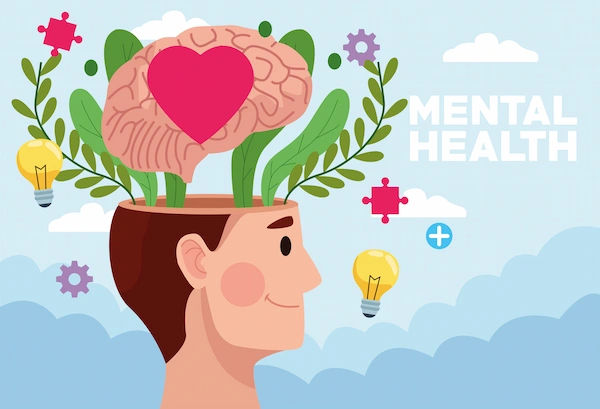The Mind-Body Link: How Mental Health Shapes Your Physical Well-Being
Explore how mental health directly affects physical well-being. Learn the biological connections, recognise physical symptoms, and discover strategies to nurture both mind and body.

Written by Dr. Siri Nallapu
Reviewed by Dr. Dhankecha Mayank Dineshbhai MBBS
Last updated on 13th Jan, 2026

Introduction
We often treat our mental and physical health as separate entities—seeing a physician for a persistent cough and a therapist for persistent worry. But this division is a dangerous illusion. Your brain is not isolated from the rest of your body; it's the command center that influences everything from your heart rhythm to your immune response. Ignoring your mental health can silently, yet severely, undermine your physical health, leading to a higher risk of chronic disease, a weakened immune system, and a lower quality of life. This article will dismantle the myth of separation, explore the powerful biological pathways that connect your mind and body, and provide actionable strategies to protect and nurture both. Understanding this connection is the first step toward true, holistic wellness.
The Biological Bridge: How Your Brain Talks to Your Body
The conversation between your mental and physical states is constant and biological, not just philosophical. This communication happens primarily through two key systems: the nervous system and the endocrine (hormone) system. When you experience stress, anxiety, or sadness, your brain triggers a cascade of physiological events designed to protect you. However, when these signals are constantly activated due to chronic mental health challenges, they begin to cause damage.
The Stress Response: Cortisol and Your Body's Alarm System
Imagine your body's stress response as a sophisticated alarm system. When you perceive a threat (a work deadline, a financial worry, social conflict), your brain's amygdala signals the hypothalamus. This activates the sympathetic nervous system, triggering the "fight-or-flight" response. Your adrenal glands pump out hormones like adrenaline and cortisol. Adrenaline increases your heart rate and blood pressure, pushing blood to your muscles. Cortisol, the primary stress hormone, increases sugars (glucose) in the bloodstream and enhances your brain's use of glucose, while also curbing non-essential functions like digestion and reproductive system growth.
This is life-saving in short bursts. But when stress is chronic, elevated cortisol levels wreak havoc. It can lead to:
• Weight gain: Especially abdominal fat, as cortisol increases appetite and signals the body to store fat.
• High blood pressure: Constant vasoconstriction strains the cardiovascular system.
• Sleep disruption: Cortisol interferes with the sleep-wake cycle, leading to insomnia.
• Blood sugar imbalances: Increasing the risk for Type 2 diabetes.
Inflammation: The Common Link to Disease
Chronic stress and elevated cortisol directly contribute to inflammation. While acute inflammation is a healthy immune response to injury, systemic, low-grade inflammation is a silent killer linked to almost every major modern disease. Research has consistently shown that individuals with chronic depression and anxiety have higher levels of inflammatory markers like C-reactive protein (CRP). This inflammation damages blood vessels, contributes to plaque buildup, and is a key player in:
• Heart disease and stroke
• Autoimmune diseases (e.g., rheumatoid arthritis)
• Neurodegenerative diseases (e.g., Alzheimer's)
• Certain cancers
This is a clear example of how ignoring mental health can cost you your physical health by keeping your body in a constant state of emergency.
Consult a Psychiatrist for the best advice
When Your Mind Affects Your Body: Physical Symptoms of Mental Struggle
Mental health conditions often speak the language of the body. Many people first visit their primary care doctor for physical complaints, unaware that the root cause is psychological. Recognising these signs is crucial for early intervention.
The Weight of Worry: Anxiety's Physical Toll
Anxiety is more than just feeling nervous. It's a full-body experience. The constant state of hypervigilance leads to tangible physical symptoms of anxiety, including:
• Muscle tension and pain: Often presenting as chronic back pain, neck pain, and headaches, including tension headaches and migraines.
• Digestive issues: The gut is often called the "second brain" due to its vast network of neurons. Anxiety can trigger irritable bowel syndrome (IBS), causing stomach pain, bloating, diarrhea, or constipation.
• Cardiovascular symptoms: Heart palpitations, a racing heart (tachycardia), and chest pain are common, often leading people to fear they are having a heart attack.
• Shortness of breath and dizziness: A result of hyperventilation or altered breathing patterns common during anxiety attacks.
The Ache of Sadness: How Depression Manifests Physically
Depression is not just emotional emptiness; it's a physical burden. The question "can depression cause fatigue?" is answered with a resounding yes. Profound fatigue and low energy are hallmark symptoms. Other physical manifestations include:
• Psychomotor agitation or retardation: Feeling physically sped up and unable to sit still, or conversely, feeling like your movements and speech are painfully slowed down.
• Unexplained aches and pains: Widespread muscle pain, joint pain, and overall physical discomfort that doesn't respond well to standard treatment.
• Changes in appetite and sleep: Significant weight loss or gain due to changes in eating; insomnia or, conversely, sleeping excessively (hypersomnia).
• A weakened immune system: Making you more susceptible to common infections like colds and flu.
The Vicious Cycle: How Physical Illness Impacts Mental Health
The relationship is profoundly bi-directional. Just as a troubled mind can lead to a sick body, a sick body can deeply affect the mind. Developing a chronic physical health condition is a significant life stressor that can trigger or exacerbate mental health issues.
Chronic Pain and Mental Fatigue
Living with persistent pain is exhausting and isolating. It can disrupt sleep, limit mobility, and make it difficult to work or socialise. This constant struggle often leads to feelings of frustration, helplessness, and depression. The emotional distress, in turn, can lower your pain threshold, making the physical pain feel even more intense. This creates a devastating feedback loop where pain worsens mood, and low mood amplifies pain.
The Emotional Burden of a New Diagnosis
Receiving a diagnosis for a condition like cancer, diabetes, or heart disease is a traumatic event. It's common to experience a period of grief, fear, and anxiety about the future, treatment, mortality, and financial costs. This emotional burden of a chronic illness is a normal response, but for many, it can develop into clinical anxiety or depression, which can then interfere with the motivation and energy needed to manage the physical condition effectively.
Lifestyle: The Pathway Where Mind and Body Meet
Your daily habits are the most accessible tools you have to positively influence both your mind and body simultaneously. They are the practical intersection of mental and physical health.
The Sleep-Mental Health Connection
Sleep is non-negotiable for repair and regulation. Poor sleep is both a symptom and a cause of mental health issues. Anxiety and rumination can cause insomnia, and sleep deprivation makes you more emotionally volatile, anxious, and susceptible to stress. Prioritising 7-9 hours of quality sleep is one of the most effective things you can do for holistic health.
Diet and Mood: You Are What You Eat
The gut microbiome produces a significant portion of the body's serotonin, a neurotransmitter crucial for mood regulation. A diet high in processed foods, sugar, and unhealthy fats can promote inflammation and negatively impact gut bacteria, which may worsen symptoms of depression and anxiety. Conversely, a healthy diet for anxiety and depression rich in fruits, vegetables, whole grains, and lean proteins provides the essential nutrients your brain needs to function optimally and fight inflammation.
Exercise: The Natural Antidepressant
Physical activity is a powerhouse for well-being. It reduces levels of stress hormones like cortisol and adrenaline while stimulating the production of endorphins, the body's natural painkillers and mood elevators. Regular exercise for mental health also promotes neural growth, reduces inflammation, and improves sleep and self-esteem. You don't need to run a marathon; a daily 30-minute brisk walk can yield significant benefits.
Practical Steps to Nurture Your Mind and Body
1. Listen to Your Body: Don't ignore persistent physical symptoms. If you have chronic headaches, stomach issues, or fatigue, consider if stress or emotional factors could be playing a role.
2. Move Daily: Find a form of movement you enjoy—walking, dancing, yoga, swimming—and aim for consistency over intensity.
3. Prioritise Sleep: Create a calming bedtime routine and keep a consistent sleep schedule.
4. Nourish Yourself: Focus on adding whole foods to your diet rather than restricting yourself.
5. Practice Mindfulness: Meditation, deep breathing exercises, and yoga can calm the nervous system and reduce the physical impact of stress.
6. Connect with Others: Social support is a buffer against stress. Make time for friends and family.
7. Seek Professional Help: This is the most important step. If your symptoms are interfering with your life, talk to a professional.
Conclusion
The evidence is clear: the ancient idea of a separation between mind and body is a modern fallacy with serious consequences for our health. Ignoring your mental health doesn't just affect your mood; it actively damages your physical well-being, increasing your risk for inflammation, chronic disease, and a lower quality of life. Conversely, neglecting your physical health can take a profound toll on your mental state. The path to true health requires an integrated approach. By listening to the signals from both your mind and body, adopting nurturing lifestyle habits, and seeking professional support when needed, you can break the vicious cycle and build a resilient foundation for a healthier, happier life. Your journey to wellness starts with acknowledging that you are one whole person. If symptoms of low mood or anxiety persist beyond two weeks and are accompanied by physical issues, consult a doctor online with Apollo24|7 for a comprehensive evaluation. They can help determine the root cause and guide you toward the right support.
Consult a Psychiatrist for the best advice
Consult a Psychiatrist for the best advice

Dr. Vidit Singh
Psychiatrist
7 Years • MD, DNB (Psychiatry)
Lucknow
Apollomedics Super Speciality Hospital, Lucknow

Dr. Susmitha Gajula
Psychiatrist
2 Years • MBBS, MD (psychiatry)
Chinagadila
Apollo Hospitals Health City Unit, Chinagadila
(25+ Patients)

Dr. Radhakanth Chunduri
Psychiatrist
30 Years • MD (Psych), DPM
Chinagadila
Apollo Hospitals Health City Unit, Chinagadila
(250+ Patients)

Dr. Jinesh Shah
Psychiatrist
20 Years • MBBS, MRCPsych (UK), CCT in Adult Psychiatry (UK), CCT in Child and Adolescent Psychiatry (UK), PG Diploma in Clinical Psychiatry (UK), Cert Hypnotherapy (UK).
Ahmedabad
Apollo Speciality hospital, Ahmedabad, Ahmedabad
(125+ Patients)

Dr. Ankit Halder
Psychiatrist
7 Years • MBBS, MD (Psychiatry)
Kolkata
MCR SUPER SPECIALITY POLY CLINIC & PATHOLOGY, Kolkata
Consult a Psychiatrist for the best advice

Dr. Vidit Singh
Psychiatrist
7 Years • MD, DNB (Psychiatry)
Lucknow
Apollomedics Super Speciality Hospital, Lucknow

Dr. Susmitha Gajula
Psychiatrist
2 Years • MBBS, MD (psychiatry)
Chinagadila
Apollo Hospitals Health City Unit, Chinagadila
(25+ Patients)

Dr. Radhakanth Chunduri
Psychiatrist
30 Years • MD (Psych), DPM
Chinagadila
Apollo Hospitals Health City Unit, Chinagadila
(250+ Patients)

Dr. Jinesh Shah
Psychiatrist
20 Years • MBBS, MRCPsych (UK), CCT in Adult Psychiatry (UK), CCT in Child and Adolescent Psychiatry (UK), PG Diploma in Clinical Psychiatry (UK), Cert Hypnotherapy (UK).
Ahmedabad
Apollo Speciality hospital, Ahmedabad, Ahmedabad
(125+ Patients)

Dr. Ankit Halder
Psychiatrist
7 Years • MBBS, MD (Psychiatry)
Kolkata
MCR SUPER SPECIALITY POLY CLINIC & PATHOLOGY, Kolkata
More articles from Mental Health
Frequently Asked Questions
1. Can stress actually make me physically sick?
Yes, absolutely. Chronic stress suppresses your immune system, making you more vulnerable to infections like the common cold and flu. It also contributes to inflammation, which is a root cause of many serious conditions like heart disease and autoimmune disorders.
2. What are some common physical signs of anxiety that people might miss?
Many people overlook the connection between anxiety and physical symptoms like persistent digestive problems (IBS), muscle tension (especially in the jaw, neck, and shoulders), chronic headaches, dizziness, and heart palpitations that aren't linked to a cardiac issue.
3. How does exercise help with both anxiety and depression?
Exercise is a natural and effective anti-anxiety and antidepressant treatment. It releases endorphins (natural mood lifters), reduces immune system chemicals that can worsen depression, and decreases stress hormones like cortisol. It also promotes neural growth and improves sleep, which positively impacts mood.
4. I have a chronic physical illness. Why am I feeling so depressed?
This is a very common and understandable reaction. Dealing with pain, lifestyle changes, uncertainty about the future, and the stress of medical management is emotionally draining. This emotional burden of chronic illness can lead to clinical depression. It's important to address these feelings with your healthcare team, as treating depression can also improve your ability to manage your physical condition.
5. When should I seek professional help for the physical symptoms of stress or anxiety?
You should seek help if your physical symptoms are persistent, severe, interfering with your daily life, or causing you significant distress. It's always wise to rule out any purely physical causes first with a doctor. If your condition does not improve after trying lifestyle methods, book a physical visit to a doctor with Apollo24|7 for a check-up. They can refer you to a mental health professional if appropriate.




